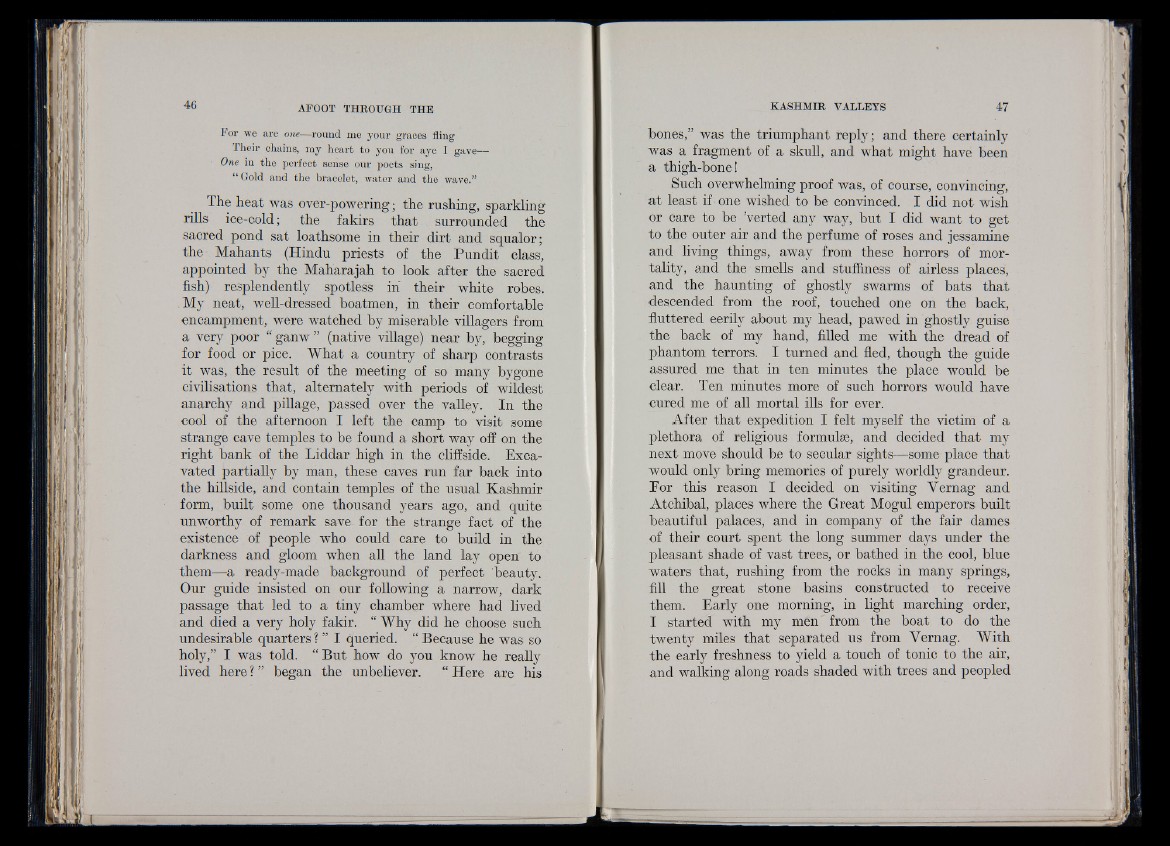
For we are one—round me your graces fling
Their chains, my heart to you for aye I gave——
One in the perfect sense our poets sing,
“ Gold and the bracelet, water and the wave.”
The heat was over-powering; the rushing, sparkling
rills ice-cold; the fakirs that surrounded the
sacred pond sat loathsome in their dirt and squalor;
the Mahants (Hindu priests of the Pundit class,
appointed by the Maharajah to look after the sacred
fish) resplendently spotless in their white robes.
.My neat, well-dressed boatmen, in their comfortable
encampment, were watched by miserable villagers from
a very poor “ ganw ” (native village) near by, begging
for food or pice. What a country of sharp contrasts
it was, the result of the meeting of so many bygone
civilisations that, alternately with periods of wildest
anarchy and pillage, passed over the valley. In the
cool of the afternoon I left the camp to visit some
strange cave temples to be found a short way off on the
right bank of the Liddar high in the cliffside. Excavated
partially by man, these caves run far back into
the hillside, and contain temples of the usual Kashmir
form, built some one thousand years ago, and quite
unworthy of remark save- for the strange fact of the
existence of people who could care to build in the
darkness and gloom when all the land lay open to
them—a ready-made background of perfect beauty.
Our guide insisted on our following a narrow, dark
passage that led to a tiny chamber where had lived
and died a very holy fakir. “ Why did he choose such
undesirable quarters ? ” I queried. “ Because he was so
holy,” I was told. “ But how do you know he really
lived here ? ” began the unbeliever. “ Here are his
bones,” was the triumphant reply; and there certainly
was a fragment of a skull, and what might have been
a thigh-bone!
Such overwhelming proof was, of course, convincing,
a t least if one wished to be convinced. I did not wish
or care to be Verted any way, but I did want to get
to the outer air and the perfume of roses and jessamine
and living things, away from these horrors of mortality,
and the smells and stuffiness of airless places,
and the haunting of ghostly swarms of bats that
descended from the roof, touched one on the back,
fluttered eerily about my head, pawed in ghostly guise
the back of my hand, filled me with the dread of
phantom terrors, I turned and fled, though the guide
assured me that in ten minutes the place would be
clear. Ten minutes more of such horrors would have
cured me of all mortal ills for ever.
After that expedition I felt myself the victim of a
plethora of religious formulae, and decided that my
next move should be to secular sights—some place that
would only bring memories of purely worldly grandeur.
Bor this reason I decided on visiting Yernag and
Atchibal, places where the Great Mogul emperors built
beautiful palaces, and in company of the fair dames
of their court spent the long summer days under the
pleasant shade of vast trees, or bathed in the cool, blue
waters that, rushing from the rocks in many springs,
fill the great stone basins constructed to receive
them. Early one morning, in light marching order,
I started with my men from the boat to do the
twenty miles that separated us from Yernag. With
the early freshness to yield a touch of tonic to the air,
and walking along roads shaded with trees and peopled